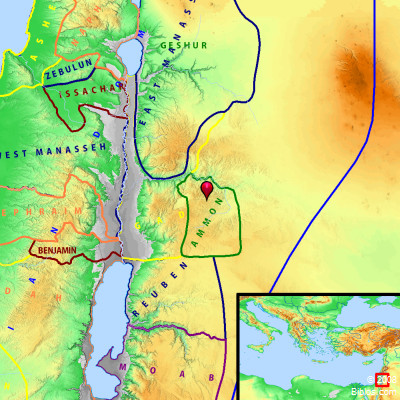Atlas  Ammon and surrounding region Maps Created using Biblemapper 3.0 Additional data from OpenBible.info You are free to use up to 50 Biblos coprighted maps (small or large) for your website or presentation. Please credit Biblos.com. Occurrences Deuteronomy 2:19 and when you come near over against the children of Ammon, don't bother them, nor contend with them; for I will not give you of the land of the children of Ammon for a possession; because I have given it to the children of Lot for a possession."Deuteronomy 2:37 only to the land of the children of Ammon you didn't come near; all the side of the river Jabbok, and the cities of the hill country, and wherever Yahweh our God forbade us. Judges 11:27 I therefore have not sinned against you, but you do me wrong to war against me. Yahweh, the Judge, be judge this day between the children of Israel and the children of Ammon." 2 Chronicles 20:10 Now, behold, the children of Ammon and Moab and Mount Seir, whom you would not let Israel invade, when they came out of the land of Egypt, but they turned aside from them, and didn't destroy them; 2 Chronicles 20:22 When they began to sing and to praise, Yahweh set ambushers against the children of Ammon, Moab, and Mount Seir, who had come against Judah; and they were struck. 2 Chronicles 20:23 For the children of Ammon and Moab stood up against the inhabitants of Mount Seir, utterly to kill and destroy them: and when they had made an end of the inhabitants of Seir, everyone helped to destroy another. Nehemiah 13:23 In those days also saw I the Jews who had married women of Ashdod, of Ammon, and of Moab: Jeremiah 9:26 Egypt, and Judah, and Edom, and the children of Ammon, and Moab, and all that have the corners of their hair cut off, who dwell in the wilderness; for all the nations are uncircumcised, and all the house of Israel are uncircumcised in heart. Jeremiah 25:21 Edom, and Moab, and the children of Ammon; Jeremiah 27:3 and send them to the king of Edom, and to the king of Moab, and to the king of the children of Ammon, and to the king of Tyre, and to the king of Sidon, by the hand of the messengers who come to Jerusalem to Zedekiah king of Judah; Ezekiel 25:5 I will make Rabbah a stable for camels, and the children of Ammon a resting place for flocks: and you shall know that I am Yahweh. Encyclopedia AMMON; AMMONITESam'-on, am'-on-its (`ammon; `ammonim): Strong's Hebrew H5983: Ammona people living East of the Jordan |



